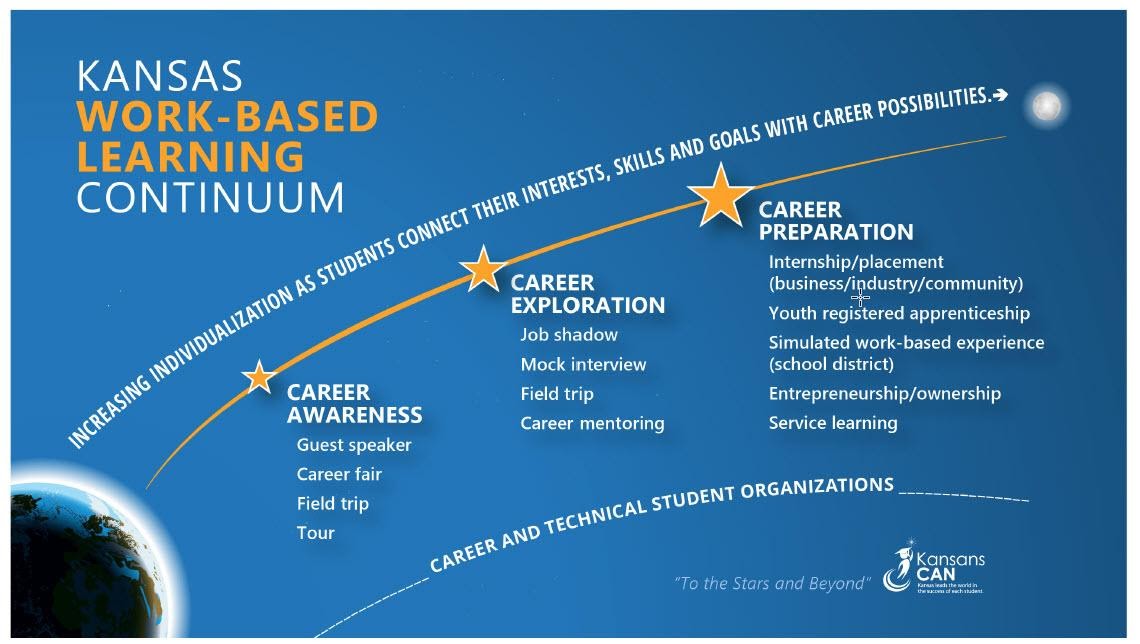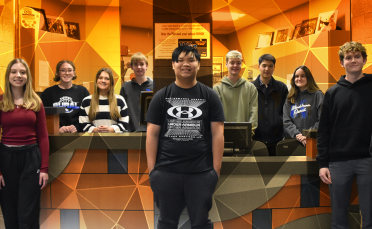A Request from Dr. Watson: Parents Needed as Part of Kansas' Work-Based Learning Efforts

Moms, dads, grandparents and guardians,
In 2015, the Kansas State Board of Education established a new vision for Kansas education — Kansas leads the world in the success of each student. As part of that vision, we want to prepare your son or daughter for life after high school. And we need you to be a part of that journey.
Individualized Plan of Study
You may have heard the term IPS — individualized plan of study — at your child’s school. Moving forward, an IPS will be developed for every child when they are in middle school to guide them from being a student to a working professional. The process of developing this plan includes parents and teachers talking with students about their passions and then planning for the student to take coursework that aligns with that passion. As your child progresses through school, their IPS will be revisited annually and updated. This means there is plenty of room for the plan to evolve as your child develops new skills and interests and when your child learns about new possibilities. I hope you’ll be actively involved in helping to develop and update your child’s plan in the upcoming years. Read more about the IPS.
Work-Based Learning
One key component of helping children grow from being a student to a professional is through work-based learning (WBL). Work-based learning allows students to participate in real-life work experiences while still in high school, better preparing them for the workforce and helping them determine which educational path best advances their goals after high school. WBL can include job shadowing, internships, apprenticeships, volunteering or part-time work experiences that give your child a chance to see what life is like in a career they’re interested in possibly pursuing. Learn more about WBL.
WBL offers students a critical opportunity to “try on” careers before starting their postsecondary plan. Some students participate in a WBL and love the experience so much it solidifies a path they want to pursue. However, others may decide after a WBL that they want to explore different paths. And that’s ok. In fact, that’s great! We want a kid to discover they can’t stand the sight of blood in high school before they spend years of their lives (and thousands of dollars) pursuing a health care career. The goal of the WBL experience is to give kids structured, real-world opportunities that help them discover more about who they are and how they want to contribute to the world of work.
Kansas Work-Based Learning Continuum
WBL in Kansas is organized in a way that offers your child an increasing level of exposure to career awareness, exploration and preparation as they progress through their K-12 years.

- Elementary School — Work-based learning starts with career awareness in the early grades. Schools can bring in guest speakers, host career fairs and have students visit a workplace to observe a workday, meet employees and ask questions.
- Middle school — In middle school, students will delve even deeper through career exploration, such as job shadowing, taking part in mock interviews, field trips and career mentoring.
- High School — Career preparation in high school can include internships at businesses or within the community, youth-registered apprenticeships, simulated work-based experiences, entrepreneurship and service learning.
We need parents involved every step of the way. Volunteer to come into your child’s classroom and talk about your job. Host your child’s class at your workplace for a field trip. Or, suggest to your employer that they establish an apprenticeship to give a high schooler the chance to work beside you and learn skills that could lay the groundwork for their future career. Parents are instrumental in bringing the world of work into the lives of your children and their peers. Imagine the impact over the course of a school year if 20 parents took 30 minutes out of their day to talk to an elementary class about their careers!
Preparing the Next Generation of Workers
The Kansas Chamber’s Challenge to Compete – Kansas Workforce 2020 report identified 20 recommendations to enhance the effectiveness of the state’s efforts to educate, train, recruit and retain a qualified workforce. Of those recommendations, five centered around expanding work experience for students. Our state’s employers know they have to become more involved in education if we’re going to keep our young people in Kansas and get them excited about the many high-demand careers that we need to fill.
The Governor’s Council on Education also believes in the importance of WBL — so much so that they’re working to make it available to every child in the state of Kansas. This will be a huge step forward to help our state better prepare every child for life after high school. While only a handful of our districts offer WBL for high-school credit today, expect to see many more offering WBL experiences in the near future.
The bottom line is that Kansas needs people pursuing all postsecondary paths to meet the needs of the state, and WBL will help your child narrow down or choose a career path. Students who have a better idea what they want to do earlier in life will be one step closer to a successful future and will save valuable time and resources in the process. Please encourage your child to include WBL into their high school plan of study, and contact your school’s counselor or CTE coordinator for more information.
We at the Kansas State Department of Education (KSDE) are excited to be a part of HirePaths, and we hope you remain connected with this program as a way to learn more about resources and opportunities to support you and your child through this important adventure. Stay tuned — we’re just getting started!
Dr. Randy Watson was named Kansas Commissioner of Education in November 2014. He is a lifelong Kansan who has spent time in the classroom as a teacher, followed by administrative positions as principal and superintendent. He also has served as a part-time faculty member in higher education.
During his tenure with the Kansas State Department of Education, Dr. Watson has rapidly become known for his visionary leadership to position Kansas as an innovator in rethinking a century-old school model. The Kansans Can vision to lead the world in the success of each student continues to drive the work of the Kansas State Board and the state education agency.



